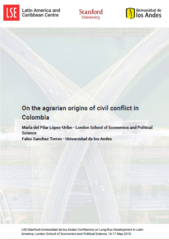
We investigate the impact of land dispossession of peasants on the origin of the civil conflict in Colombia. Using a matching-pair instrumental variable approach, we show that the historical dispossession of peasants’lands by landlords that led to the rise of peasant grievances is associated with the presence of the rural guerrilla movement-The Revolutionary Forces of Colombia (FARC)- during the first stage of the Colombian civil conflict (1974-1985).
This study exploits variation in floods to identify how peasants’ land dispossessions during the export boom (1914-1946) determine the rise of rural guerrilla movements and the consolidation of their rebel activities. Using a novel municipal-level data set on natural disasters and land dispossession, the study documents that municipalities experiencing floods during the years 1914-1946 were substantially more likely to have land dispossession than municipalities where floods was not severe. Floods reduced temporarily the conditions of the land and its value, facilitating the dispossession of the peasants of their lands by large landowners.
We propose two mechanisms through which previous land dispossession facilitated the emergence of rebel armed groups. On the one hand, exposure to previous events of violence gave military training and access to weapons and military experience to the rural population that likely emboldened the formation of rebel groups. On the other hand, the ideological cohesion stemming from radical liberals and communists exacerbated the grievances and helped the emergence of rebel armed groups.
Read the document here.
